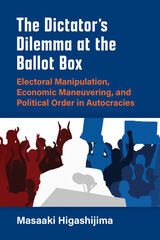
Contrary to our stereotypical views, dictators often introduce elections in which they refrain from employing blatant electoral fraud. Why do electoral reforms happen in autocracies? Do these elections destabilize autocratic rule? The Dictator’s Dilemma at the Ballot Box argues that strong autocrats who can garner popular support become less dependent on coercive electioneering strategies. When autocrats fail to design elections properly, elections backfire in the form of coups, protests, and the opposition’s stunning election victories. The book’s theoretical implications are tested on a battery of cross-national analyses with newly collected data on autocratic elections and in-depth comparative case studies of the two Central Asian republics of Kazakhstan and Kyrgyzstan.


Most of us think of punishment as an ugly display of power. But punishment also tells us something about the ideals and aspirations of a people and their government. How a state punishes reveals whether or not it is confident in its own legitimacy and sovereignty. Punishment and Political Order examines the questions raised by the state’s exercise of punitive power—from what it is about human psychology that desires sanction and order to how the state can administer pain while calling for justice. Keally McBride's book demonstrates punishment's place at the core of political administration and the stated ideals of the polity.
"From start to finish this is a terrific, engaging book. McBride offers a fascinating perspective on punishment, calling attention to its utility in understanding political regimes and their ideals. She succeeds in reminding us of the centrality of punishment in political theory and, at the same time, in providing a framework for understanding contemporary events. I know of no other book that does as much to make the subject of punishment so compelling."
—Austin Sarat, Amherst College
"Punishment and Political Order will be welcome reading for anyone interested in understanding law in society, punishment and political spectacle, or governing through crime control. This is a clear, accessible, and persuasive examination of punishment—as rhetoric and reality. Arguing that punishment is a complex product of the social contract, this book demonstrates the ways in which understanding the symbolic power and violence of the law provides analytical tools for examining the ideological function of prison labor today, as well as the crosscutting and contingent connections between language and identity, legitimation and violence, sovereignty and agency more generally."
—Bill Lyons, Director, Center for Conflict Management, University of Akron
"Philosophical explorations of punishment have often stopped with a theory of responsibility. McBride's book moves well beyond this. It shows that the problem of punishment is a central issue for any coherent theory of the state, and thus that punishment is at the heart of political theory. This is a stunning achievement."
—Malcolm M. Feeley, University of California at Berkeley
Keally McBride is Assistant Professor of Politics at the University of San Francisco.

In the late 1980s, most of the world still associated Vietnam with resistance and war, hardship, refugees, and a mismanaged planned economy. During the 1990s, by contrast, major countries began to see Vietnam as both a potential partner and a strategically significant actor—particularly in the competition between the United States and an emerging China—and international investors began to see Vietnam as a land of opportunity.
Vietnam remains a Leninist party-state ruled by the Communist Party of Vietnam that has reconciled the supposedly irreconcilable: a one-party system and a market-based economy linked to global value chains. For the Party stability is crucial and, recently, increasing economic openness has been combined with growing political control and repression.
This book, undertaken by scholars from Vietnam, North America, and Europe, focuses on how the country’s governance shapes its politics, economy, social development, and relations with the outside world, as well as on the reforms required if Vietnam is to become a sustainable and modern high-income nation in the coming decades.
Despite the challenges, including systemic ones, the authors remain optimistic about Vietnam’s future, noting the evident vitality of a determined society.

In the late 1980s, most of the world still associated Vietnam with resistance and war, hardship, refugees, and a mismanaged planned economy. During the 1990s, by contrast, major countries began to see Vietnam as both a potential partner and a strategically significant actor—particularly in the competition between the United States and an emerging China—and international investors began to see Vietnam as a land of opportunity.
Vietnam remains a Leninist party-state ruled by the Communist Party of Vietnam that has reconciled the supposedly irreconcilable: a one-party system and a market-based economy linked to global value chains. For the Party stability is crucial and, recently, increasing economic openness has been combined with growing political control and repression.
This book, undertaken by scholars from Vietnam, North America, and Europe, focuses on how the country’s governance shapes its politics, economy, social development, and relations with the outside world, as well as on the reforms required if Vietnam is to become a sustainable and modern high-income nation in the coming decades.
Despite the challenges, including systemic ones, the authors remain optimistic about Vietnam’s future, noting the evident vitality of a determined society.
READERS
Browse our collection.
PUBLISHERS
See BiblioVault's publisher services.
STUDENT SERVICES
Files for college accessibility offices.
UChicago Accessibility Resources
home | accessibility | search | about | contact us
BiblioVault ® 2001 - 2024
The University of Chicago Press









